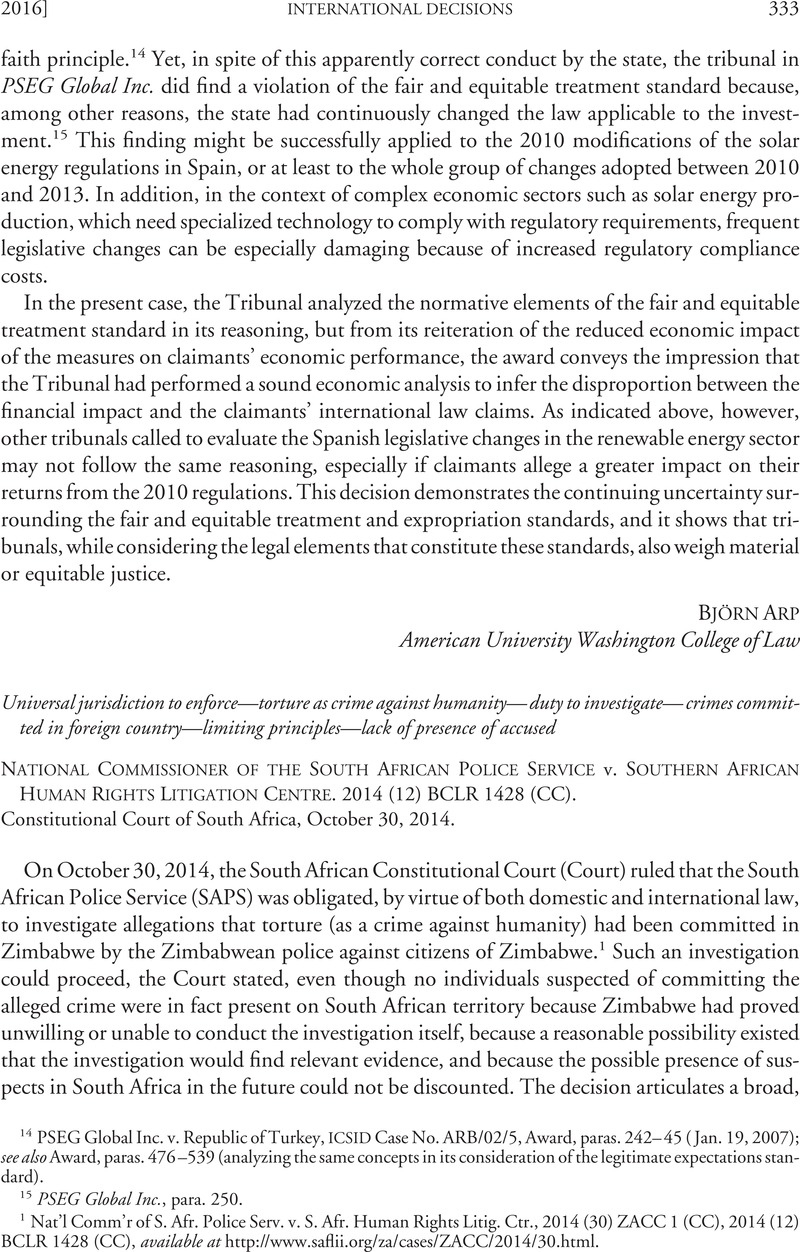No CrossRef data available.
Article contents
National Commissioner of the South African Police Service v. Southern African Human Rights Litigation Centre
Published online by Cambridge University Press: 20 January 2017
Abstract

- Type
- International Decisions
- Information
- Copyright
- Copyright © American Society of International Law 2016
References
1 Nat’l Comm’r of S. Afr. Police Serv. v. S. Afr. Human Rights Litig. Ctr., 2014 (30) ZACC 1 (CC), 2014 (12) BCLR 1428 (CC), available at http://www.saflii.org/za/cases/ZACC/2014/30.html.
2 Rome Statute of the International Criminal Court, July 17, 1998, as amended (Jan. 16, 2002), 2187 UNTS 3 [hereinafter Rome Statute]. The Republic of South Africa became a party to the Rome Statute in 2000; Zimbabwe has neither signed nor ratified the treaty.
3 SALC, which is based in Johannesburg, is funded and supported by the International Bar Association and the Open Society Initiative for Southern Africa. It filed the case as Southern African Human Rights Litigation Centre.
4 See Implementation of the Rome Statute of the International Criminal Court Act 27 of 2002 §4(3) (providing that “[i]n order to secure the jurisdiction of a South African court for purposes of this Chapter, any person who commits a crime contemplated in subsection (1) outside the territory of the Republic, is deemed to have committed that crime in the territory of the Republic if—(a ) that person is a South African citizen; or (b ) that person is not a South African citizen but is ordinarily resident in the Republic; or (c ) that person, after the commission of the crime, is present in the territory of the Republic; or (d ) that person has committed the said crime against a South African citizen or against a person who is ordinarily resident in the Republic”), at http://www.saflii.org.
5 Section 205(3) of the South African Constitution provides that “[t]he objects of the police service are to prevent, combat and investigate crime, to maintain public order, to protect and secure the inhabitants of the Republic and their property, and to uphold and enforce the law.” See Const. §205(3), at http://www.gov.za (follow “Documents” hyperlink in search bar).
6 Convention Against Torture and Other Cruel, Inhuman or Degrading Treatment or Punishment, Arts. 4 –5, 7, Dec. 10, 1984, S. Treaty Doc. No. 100-20 (1988), 1465 UNTS 85.
7 In concluding that torture was a crime of universal jurisdiction prohibited under customary international law, Judgment, para. 35, the Court quoted the dictum in Filártiga v. Peña-Irah, 630 F.2d 876, 890 (2d Cir. 1980), that “the torturer has become, like the pirate or the slave trader before him, hostis humani generis, an enemy of all [hu]mankind,” Judgment, para. 36.
8 See note 5 supra.
9 Rome Statute, supra note 2, Art. 17(1)(a).
10 Southern Africa Litigation Centre, Positive Reinforcement: Advocating for International Criminal Justice in Africa, Case Study 2 (2013), available at http://www.southernafricalitigationcentre.org.
11 Restatement (Third) of the Foreign Relations Law of the United States §403 (Am. Law Inst. 1987).
12 Id., §404.
13 Created under the Treaty of the Southern African Development Community of 1992, the tribunal opened in 2005. It was mandated with overseeing compliance with the treaty and also was given competence to adjudicate individual human rights complaints. Its operations were suspended in 2010. See Karen J. Alter, James Thuo Gathii, & Laurence R. Helfer, Backlash Against International Courts in West, East and Southern Africa: Causes and Consequences, 27 Eur. J. Int’l L. (forthcoming 2016), available at http://ssrn.com/abstract=2591837.
14 Quoting Nelson Mandela, South Africa’s Future Foreign Policy, Foreign Aff., Nov.–Dec. 1993, at 86, 97.




